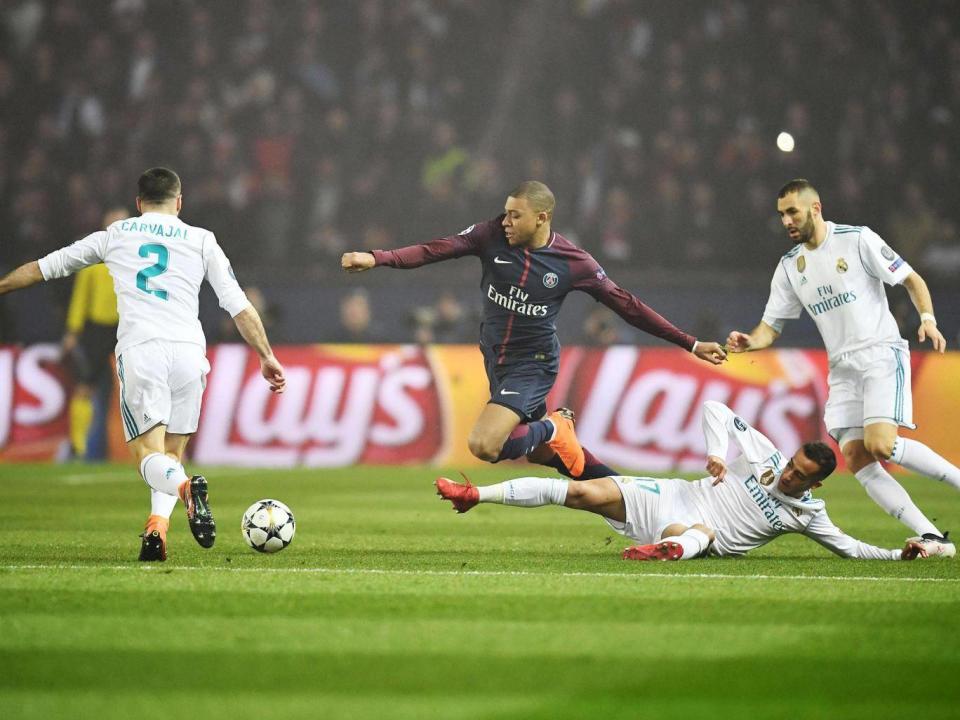Ligue 1: PSG have become a platform for self promotion and things won't change until their mentality does
Shortly before half-time at the Parc des Princes, a swell of noise surged around the stadium and filled it like water. Kylian Mbappe had timed his run to perfection and was free, clear, on his own. The angle was narrowing, but with Edinson Cavani haring unmarked through the centre, surely this would be the moment that Paris Saint-Germain took the lead, reduced their deficit to 3-2, and seized the momentum in their Champions League last-16 tie against Real Madrid.
Of course, had Mbappe squared the ball to Cavani, it would have been a noteworthy event in itself. On a night of familiar frustrations for the French league leaders, perhaps the most familiar of all was the way in which their much-heralded front three seemed to be playing three entirely different games. Mbappe passed the ball to Cavani once all night. Cavani didn’t pass the ball to Mbappe or Angel di Maria at all. Di Maria didn’t pass the ball to Cavani, and passed it once to Mbappe. This, perhaps, is the curse of filling your team with superstars. Everyone wants to be the man.
And so of course Mbappe took on the shot. It was saved by Keylor Navas. Cavani looked furious, but perhaps deep down he knew he would have done exactly the same thing. Real Madrid won 2-1, an aggregate score of 5-2, and so the al-Khelaifi dream of a maiden Champions League title remains, seven years after inception, indefinitely deferred.
The most likely upshot, you would think, is more of everything: more signings, more upheaval, more shock and awe, more earth-shattering regeneration. Buying Neymar didn’t work, even if you can hardly blame them for the season-ending injury that put him out of the second leg of this tie. Maybe Cristiano Ronaldo this summer? Or perhaps a No10 to orchestrate things in the final third. Who’s decent out there?
And yet as another Champions League draws to a conclusion without PSG’s involvement, you wonder whether this will be the year that the penny finally drops for France’s richest club and its Qatari ownership. Coach Unai Emery will doubtless be replaced this summer, even if he does come through with another domestic treble. But is there the appetite in Paris for a genuine shift in approach, one that seeks to build rather than merely assemble?
READ MORE: Real Madrid shatter PSG’s European dream
READ MORE: Liverpool safely through in Champions League
Of course, teams of superstars have won Champions Leagues before; indeed, these days you would almost call it a prerequisite. But what links virtually all this competition’s winning sides, from Zinedine Zidane’s Real Madrid to Roberto di Matteo’s Chelsea to Jose Mourinho’s Porto, is a sense of shared purpose, a common aim, a partial surrender of personal ambition in the service of a wider goal. That’s not to say you need anything quite so annoyingly and vaingloriously pretentious as a Big Idea. But you do need some sort of skeletal structure upon which to hang your multitude of varied and diverse talents.

What, then, is PSG’s shared purpose? It’s hard to discern. Often it’s “pass the ball to Neymar”, which is why paradoxically, it’s even harder to tell what they’re doing when he’s not playing. But even as they recycled the ball on Tuesday night, the distinct whiff of performative individualism was hard to shake off. Everyone, from Dani Alves to Adrien Rabiot to Marco Verratti, wanted to do something eye-catching before moving the ball along: a little stepover, a body feint, a tight turn, almost as if trying to justify their time on the ball.
And this, perhaps, is the biggest problem with this team. There is not one purpose but eleven, not one objective but many. Like one of those hastily-assembled boybands you see on The X-Factor, PSG has become a vessel for naked individual ambition, the place where you go to fulfil your destiny and nobody else’s. How can you build an elite footballing unit when your front three won’t even pass it to each other?
And so, in a rather neat way, that Mbappe chance encapsulated the very modern dilemma that superclubs like PSG face at the sharp end of this competition: how do you build a long-term project when that very project is built on the idea of instant gratification? Perhaps this is the ultimate irony of the PSG tale: that the world’s most impatient club is being forced to wait, and wait, and wait, for the one thing it really wants.

 Yahoo Sport
Yahoo Sport 






































